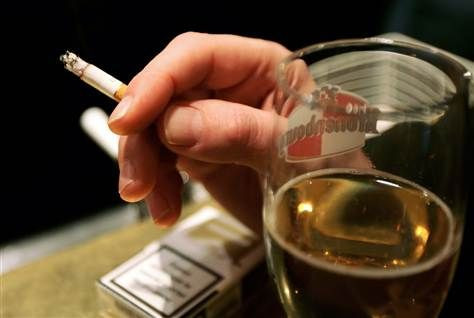Why Does Smoking Cigarettes Make You Want To Drink Alcohol?

If you've ever attended a hipster party in Brooklyn, then you're familiar with this pattern. After a few drinks, your friend who smokes is in desperate need of a cigarette. Wait few minutes, and they suddenly want another beer.
It's no secret that booze and nicotine perpetuate each other's cravings, but the biological underpinnings remain murky. A new study published today in Neuron has uncovered a possible explanation that involves stress hormones and the brain's pleasure centers.
"Our findings indicate the mechanisms by which nicotine influences the neural systems associated with alcohol abuse, providing a foundation for conceptualizing strategies aimed at diminishing the link between smoking and later alcohol abuse," said senior author Dr. John Dani, of the Baylor College of Medicine.
The researchers investigated the relationship between the two vices by giving a dose of nicotine to rats before exposing them to alcohol. They found that nicotine could still boost a rat's desire for self-adminstering booze, even if there was 15 hours between treatments. It takes about an hour-and-a-half for nicotine to clear itself from a rodent's body, suggesting the long-term alteration in mental cravings for alcohol.
These cravings were dependent upon the multifarious effects that alcohol has on dopamine and brain's pleasure centers. It's been well described that alcohol can boost dopamine in these brain regions, inducing feelings of elation.
But booze can also serve as a brake within the mind's reward centers, dampening its own ability to induce bacchanal delight. This may contribute to a cycle of diminishing returns, where more alcohol is needed to reach prior levels of enjoyment — in other words, a pleasure tolerance.
The researchers found that nicotine turned alcohol into a better brake; thus, more self-administration of alcohol was needed to stimulate the same levels of dopamine release in the brain's pleasure centers.
Nicotine didn't directly act upon the dopamine-related neurons within the mind, but rather induced a systemic increase of stress hormones called glucocorticoids. Prior work has shown that stress hormones diminish the dopamine-pleasure response in rodents.
This research argues for the existence of a cigarette-stress hormone-alcohol-pleasure loop that may promote a smoker's appetite for imbibing and potentially alcohol abuse.
"Young people typically experiment with nicotine from tobacco in their teens, and that exposure possibly contributes to a greater vulnerability to alcohol abuse later in life. Therefore, greater vigilance is called for to prevent the initial exposure to nicotine and to follow those at risk," said Dani. "In addition, our work suggests that stress hormones are candidate targets for prevention or treatment therapies."
Source: Doyon WM, Dong Y, Ostroumov A, Thomas AM, Zhang TA, Dani JA. Nicotine Decreases Ethanol-induced Dopamine Signaling and Increases Self-administration via Stress Hormones. Neuron. 2013.
Published by Medicaldaily.com



























